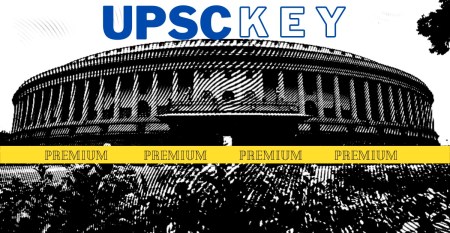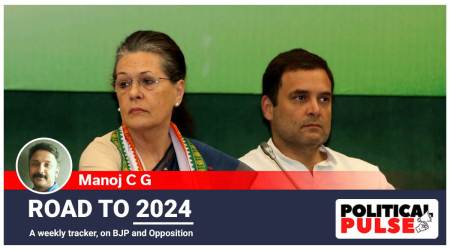27% of Delhi students left out of midday meal in 2nd pandemic year: Centre
AMID A huge jump in the enrolment of students in government schools in the second pandemic year (2021-22), an estimated 4.88 lakh children — adding up to 27 per cent of the total enrolment — were left out of the midday meal scheme in Delhi “due to shortage of foodgrains”, according to a Union government document.
An increase in the enrolment of students in government schools is seen as an indicator of economic hardship.
Buy Now | Our best subscription plan now has a special price
Based on average attendance numbers registered by schools during pre-Covid times, the Programme Approval Board (PAB), which decides the work plan and budget for the midday meal scheme annually, had budgeted for 6.45 lakh children in primary classes (I-V) and 6.39 lakh at the upper primary (VI-VIII) level in Delhi for 2021-22.
According to the minutes of the PAB meeting held on May 9, “GNCT (Government of the National Capital Territory) of Delhi informed that against the PAB-PM POSHAN approval of children, additional coverage of 5,23,572 children was reported due to increase in the enrolment and further mentioned that due to shortage of foodgrains, coverage of all enrolled children fell short.” The minutes were issued on June 3.
The meeting was attended by Union School Education Secretary Anita Karwal and Delhi government’s Director, Education, Himanshu Gupta among others.
“PAB raised concern over the issue of submitting the information to the ministry very late. PAB mentioned that GNCT of Delhi should have submitted proposal for approval of additional number of children after 2nd quarters ot FY 2021-22. The timely submission of additional proposal may have been helpful in covering all children against enrolment during closure of schools during pandemic,” said the minutes of the meeting.
Eventually, the Delhi authorities could cover, “on an average basis”, 7.44 lakh children in primary classes and 5.75 lakh children in upper primary classes, according to the meeting report, indicating that about 4.88 lakh children were left out of the scheme.
The midday meal or PM-POSHAN scheme, under which hot cooked meals are served to address the nutritional needs of children, covers government and government-aided school students of classes I-VIII, as well as pre-primary classes. During closure of schools due to the pandemic, the food security allowance was continued through the distribution of dry ration kits.
When contacted, a Delhi government spokesperson said, “For each quarter, we lifted our allocated foodgrains and disbursed. Due to uncertainty of school reopening, the actual estimate of additional requirements could be made only in the last quarter, and the same was conveyed to the central government. But the additional foodgrains has not been released to us.”
In the national capital, primary level education is handled by the municipal corporation as well as the Delhi government, which have also started schools with classes from I to XII. The PAB meeting did not have officials from the MCD.
Raising several other shortcomings in the implementation of the scheme in the city, the PAB put on record that “there is no dedicated structure in GNCT of Delhi for smooth implementation of PM POSHAN.”
Under the scheme, each student was allotted a daily allowance of Rs 4.97 for primary classes and Rs 7.45 for upper primary classes during the 40-day period when schools were shut for summer holidays. According to the PAB, the Delhi authorities has not transferred this amount to the beneficiaries.
“The allowance to be transferred to students through DBT was received by the Delhi government from Central government as late as mid-March. It is not logically or technically possible to disburse the same in the next 15 days. Our request to revalidate the disbursement in the current financial year is pending with Central government. We will be able to disburse the same as soon we receive their approval,” said the Delhi government spokesperson.
According to the PAB, only 16 per cent of schools in Delhi are linked with the PM-POSHAN MIS portal, which captures critical indicators such as the number of meals served and the number of folic acid tablets distributed. “Since the last three to four years, despite repeated requests, GNCT of Delhi has not registered all 3,055 schools on MIS web portal, nor have they (submitted) annual and monthly data entries…there is a huge discrepancy of entries in Annual Work Plan and Budget 2022-23, quarterly progress reports and MIS portal,” said the minutes of the meeting.
“No health check-up of children was done, neither iron and folic acid and deworming tablets were distributed,” said the PAB.







